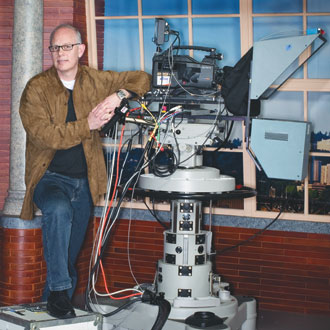 Push and Pull
Push and Pull
Can shows like Dateline balance good journalism and an appetite for the salacious?
For sixteen years, Tim Gorin '78 worked as a producer at Dateline NBC, the news magazine show known for its political and crime coverage, consumer advocacy reports, and in-depth interviews, along with its controversial "To Catch A Predator" series. He is currently an executive producer with the Smithsonian Channel. Gorin has worked at all three broadcast networks, and is the recipient of a 1995 National News Emmy Award and a National Headliner Award. His 2006 NBC documentary Rescue on Roberts Ridge, about Army Rangers ambushed in the mountains of Afghanistan, received an Edward R. Murrow award in 2007.
Magazine-style television shows like Dateline have been a staple for decades. Do these shows still have power and value, especially in an ever-more-cluttered news realm? I think they do. The stories they tell are universal ones, and I'm still of the mind that there is a real hunger for that out there. Good stories and good storytelling and good journalism will always find an audience.
Does concern about ratings affect story choices? To some degree. Maybe even to a disturbing degree. There was a time when the news division was not expected to make money; it was just a public service. But even then, there were pressures. There's always a push and pull. In the shows that I've been involved with, at the end of the day journalism was the main thing. But clearly, if it was a story that editors or executive producers didn't think people were interested in, that was a factor and continues to be a factor. Still, I don't think that good journalism and high ratings have to be mutually exclusive. The success of a show like 60 Minutes really proves that.
Has there been pressure on shows like Dateline to serve up more celebrity news or sensational stories? There's always been an appetite for salacious news and sex and scandal. It's just human nature. I think we hear more about it now; there are more outlets for it. Shows like TMZ and Web sites like www.perezhilton.com have brought it to new heights. Like anything else, we all have the power to change the channel or click on a different Web site. Ultimately, that's how Americans are going to vote.
What about "To Catch a Predator"? I was not involved in producing [that show]. The ultimate irony was that it was enormously successful and got huge ratings, but the shows themselves became increasingly sensational and eventually NBC found it to be difficult to find advertisers to purchase commercial time. So that, in addition to some well-publicized lawsuits, made it challenging for the network to continue production of that franchise.
How has the Internet affected TV news? The networks are all trying to figure out how to monetize the Internet and struggling to figure out how to cope with a huge loss of viewers, not only to the Internet but also to cable. A lot of the broadcast networks and newspapers are still clinging to an old business model, which I think is essentially a failed model now. But I think change is good. Networks will need to learn to adapt in order to stay alive.
What's your sense of current public trust in the media? There is probably a higher degree of skepticism now than there has been in a long time. I don't know that that's a bad thing. For years, people were used to being spoon-fed. You had these voice-of-God anchors that told you what they thought you needed to know in thirty minutes. Amazingly, no matter how much or how little happened in the world that day, there were only thirty minutes of news! Everybody just accepted that. Walter Cronkite would end his broadcast saying, "That's the way it is," in a very authoritative way, not even allowing, metaphorically, that maybe there were diverging views. It wasn't, "That's the way I see it," it was, "That's the way it is." Now there are a multitude of ways for people to acquire the news, and that's a positive change.
Will there still be on-air anchors and analysts in the future? Yes, I think so. What's going on in the world today is so incredibly complex that I think it is helpful to have someone who can offer some guidance or perspective on what's happening. But I think people are less willing to accept any one person as having a monopoly on the truth or on reality. One thing that the Internet has done is really open people's eyes up to divergent views.
Do you have feedback on this page?
